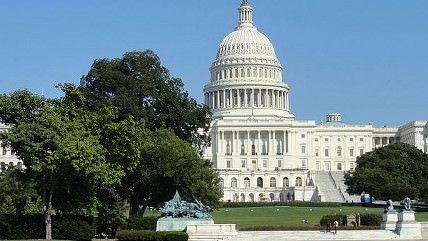Spring Clean the Government
We could move about so much more freely if our lives weren't buried in government's junk.


Spring cleaning is a healthy tradition. If only politicians did it!
They don't.
When Barack Obama ran for president, he promised to clean house. "I'm not a Democrat who believes that we can or should defend every government program just because it's there," he said. "There are some that don't work."
I cheered when I heard that! But politicians always say they'll get rid of waste. Then, once in power, they spend more. Obama sure has.
"We just need to cut back!" said Obama, the candidate. He promised to end "waste at the Economic Development Agency (EDA) and the Export-Import Bank that's become little more than a fund for corporate welfare." Good for him. Yet both programs thrive: The Ex-Im Bank just gave another $8 billion to Boeing, and the EDA spent $2 million to build a wine-tasting room and "culinary amphitheater."
Taxpayers were also forced to give $150,000 to promote a puppet festival on Long Island, $98,000 to build an outhouse in Alaska, and a million dollars to "study the influence of romance through novels and film."
Both the left and right denounce the other party's spending, but expensive waste is supported by both. Neither party makes much effort to cut farm subsidies or NASA—or to end subsidies for big corporations, the people who need it least. Sen. Tom Coburn (R-Okla.) is the rare conservative critic of waste who doesn't spare the military. On my show this week, he points out that the Pentagon destroyed $7 billion worth of weapons in Afghanistan and Iraq instead of shipping them home.
"That just shows you the inefficiency," says Coburn.
Mattie Duppler, of Americans for Tax Reform, likens recipients of government handouts to ticks that suck the populace's blood.
Welfare for businesses is even more harmful than welfare for poor people, because it kills the free enterprise that creates real prosperity. "When you've got government putting its thumb on the scale," says Duppler, "saying this business deserves more attention, more money, more government support than another one, that's … the centrally planned economy."
Centrally planned economies bring stagnation and poverty.
Many people concerned about big government focus on high taxes. High taxes are bad, but I worry more about the spending. Spending is a tax. Since government has no money of its own, the spending money must come from you.
Today I worry even more about the sheer quantity of rules. There are now 170,000 pages of federal laws and many more local rules. If you can't get a job, there's a good chance that this spider web of regulations is the reason why.
After recessions, employment used to bounce back quickly, but not this time. What employer wants to hire when doing so requires fighting incomprehensible complexity and risking punishment for violating some obscure rule? I'd be afraid to build a serious business. Today's laws are so complex even the lawyers don't understand them.
And the clutter gets worse. Every day, regulators craft more rules. It's always more. If you're a regulator, and you don't add rules, you think you're not doing your job.
So now that spring is about to arrive, let's give government that overdue cleaning. Eliminate half the 170,000 pages of federal laws, scrap useless Cabinet departments, and cut the $4 trillion in spending in half. We could move about so much more freely if our lives weren't buried in government's junk.
Laws stop me from opening my own lemonade stand, dictate where kids must attend school, and forbid voluntary interactions between consenting adults. Clean this stuff away!
When government is big, we become smaller. When we're trapped in the web of their rules, we don't innovate; we become passive.
To clean house, pass the Stossel Rule. It's simple: For every new regulation bureaucrats pass, they must repeal five old ones.
It would be a start.
Editor's Note: As of February 29, 2024, commenting privileges on reason.com posts are limited to Reason Plus subscribers. Past commenters are grandfathered in for a temporary period. Subscribe here to preserve your ability to comment. Your Reason Plus subscription also gives you an ad-free version of reason.com, along with full access to the digital edition and archives of Reason magazine. We request that comments be civil and on-topic. We do not moderate or assume any responsibility for comments, which are owned by the readers who post them. Comments do not represent the views of reason.com or Reason Foundation. We reserve the right to delete any comment and ban commenters for any reason at any time. Comments may only be edited within 5 minutes of posting. Report abuses.
Please to post comments


Possibly, but I am willing to bet most of those rules are unenforceable and thus ignored by most small businesses, employers and employees.
Testing, can I fucking comment now?
Fuck this shit, I'm going go do some actual work now. Reason's not getting any more page views out of me until their goddamned comments are fixed.
Spring cleaning is a nice analogy, assuming that you clean your house with a flamethrower.
Fire is the cleanser!
It's a nice sentiment, but it's hard to meaningfully quantify regulatory code in terms of its effect. There are many pages whose effect is virtually nil, and then a few words here & there that can have a vast effect. And it's also possible to increase regulatory burdens by lopping out pieces of code.
Government doesn't need a cleaning.
Cleansing is what it needs.
Assuming the Reason servers haven't had a total meltdown and are remotely functional tomorrow, could you guys re-post this so we can live thread Stossel?
To clean house, pass the Stossel Rule. It's simple: For every new regulation bureaucrats pass, they must repeal five old ones.
Along those same lines I propose a new penaltax of $10,000 for any politician who proposes a new law, and a $500 tax credit for repealing old laws.
I like that one. How about this too; let any adult citizen challenge any rule, regulation, or program on the grounds that A) it is unconstitutional, B) it doesn't work as advertised, C) it operates in defiance of common sense, or D) it is in violation of some other rule, regulation, or law. If the challenge is upheld, the rule, regulation, or program is immediately scrapped, may not be revived in any guise for five years, and the citizen in question is granted whatever yearly budget was associated with the rule, regulation, or program, tax free.
Make greed work FOR us.
Need a kleenex?
But ROADZ!!! Somalia! Safety! Children! *arrghabibble*
/progtard
This thread needs to be bumped tonight so we can live comment like The Independents.
Not as much as a FULLY FUNCTIONING COMMENTS MODULE, I'm sorry to say.
Can't say for sure. Never met the guy. But he seems like quite the nice fellow, always shaking hands with the audience after each show. Don't see that very often.
His heart is in the right place and he is entertaining however his argumentation skills are virtually non existant and his big ideas tend to fall rather flat.
We could certainly do worse as a populizer of freedom based solutions but he should never be considered a leader of anything
Don't sell the guy short. He's got visibility and is a very like-able broadcaster.
Going after corporate welfare first is politically astute. Should be the libertarian mantra. Even lefties would be hard pressed not support it.
Yes. This country is desperate for more Stossels. A lot more...
I've got about a years worth of his TV shows on my DVR. I like the guy, but can't seem to dedicate much time to watch.
I could probably learn something if I did, though.
problem is, they support corporate welfare... but only for their lefty corporations.